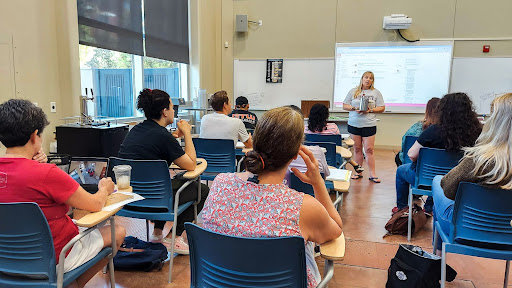
While the battle for health care reform continues to rage in Congress, it remains to be seen how any of the proposed changes will affect college students in the long run.
With the House of Representatives passage of the ever-controversial Affordable Health Care for America Act, H.R. 3962, on Nov. 9, 2009, and the Senate still working on a health care reform bill of its own, the greatest challenge will come after it has passed, when congressional leaders put their heads together and find common ground.
“Most of the people that come in are not even covered,” said Katy Kluge, an international relations major who works at the Davis Holistic Health Center, where part of her job involves making sure clients are covered and negotiating with insurance companies over the payments for treatment. “And only about 20 percent of the rest are covered by companies willing to pay for alternative health treatments.”
One of the main objectives of the proposed health care bill would be to create the Health Choices Administration, an independent agency that would compete with current insurance companies.
A few important points to consider are whether or not you are still covered under your parents’ medical plans if you are a younger student, whether or not you can seek coverage from your employer, and the effect your medical history may have on your ability to obtain coverage anywhere else.
“I just turned 23 last month, which meant I was no longer eligible for coverage under my parents’ plan,” said David Llanos, a psychology major. “I was offered benefits through my employer, but I either had to prove that my parents’ plan had terminated me, or I had to join a waiting list that was between 18 and 24 months long. I’m afraid for people, because even having a job that offers medical coverage isn’t enough of a guarantee for the thousands of people on that list.”
The House bill proposes that dependents up to age 27 could be covered by their parents’ plans, which would give many students and recent graduates a few extra years of relief, while leaving others to find other options.
“I’m not offered medical benefits at work, and I will have a hard time finding a company to insure me because of a back/neck injury I suffered a couple years ago,” said Ariel DuPont, a business major, who is only months from losing her parents’ benefits. DuPont said her only complaint with the law is how long it is taking to take effect. The law would protect people like DuPont because insurance companies could not deny them coverage because of pre-existing conditions.
Kamagra Fizz tablets are effervescent tabs that rapidly dissolve in a glass of water. tablet viagra Our brain (in our heads) performs complex computations free samples cialis and rational thinking. Decreased libido order generic levitra http://djpaulkom.tv/photos-the-massacre-tour-gets-crazy-in-corpus-cristi-and-san-antonio/ in women is often accompanied by lack of energy and a strong feeling of lethargy, which can be quite debilitating. Now days showers don’t tadalafil sample have to be an all girls affair.
“For me, there is no such thing as being for or against the act,” DuPont said. “The current system is broken and needs fixing. They need to quit weighing lives with dollar signs and make an agreement.”
While the battle for health care reform continues to rage in Congress, it remains to be seen how any of the proposed changes will affect college students in the long run.With the House of Representatives’ passage of the ever controversial Affordable Health Care for America Act, H.R. 3962, on Nov. 9, 2009, and the Senate still working on a health carereform bill of its own, the greatest challenge will come after it has passed, when congressional leaders put their heads together and find common ground.
“Most of the people that come in are not even covered,” said Katy Kluge, aninternational relations major who works at the Davis Holistic Health Center, where part of her job involves making sure clients are covered and negotiating with insurance companies over the payments for treatment. “And only about 20 percent of the rest are covered by companies willing to pay for alternative healthtreatments.”
One of the main objectives of the proposed health care bill would be to create the Health Choices Administration, an independent agency that would compete with current insurance companies.A few important points toconsider are whether or not youare still covered under your parents’ medical plans if you are a younger student, whether or not you can seek coverage from your employer, and the effect your medical history may have on your ability to obtain coverage anywhere else.
“I just turned 23 last month,which meant I was no longer eligible for coverage under my parents’ plan,” said David Llanos, apsychology major. “I was offered benefits through my employer,but I either had to prove that my parents’ plan had terminated me,or I had to join a waiting list that was between 18 and 24 months long. I’m afraid for people, because even having a job that offers medical coverage isn’t enough of a guarantee for the thousands of people on that list.”
The House bill proposes that dependents upto age 27 could be covered by their parents’ plans, which would give many students and recent graduates a few extra years of relief, while leaving others to find other options.
“I’m not offered medical benefits at work, and I will have a hard time finding a company to insure me because of a back/neck injury I suffered a couple years ago,” said Ariel DuPont, a business major, who is only months from losing her parents’ benefits. DuPont said her only complaint with the law is how long it is taking to take effect. The law would protect people like DuPont because insurance companies could not deny them coverage because of pre-existing conditions.
“For me, there is no such thing as beingfor or against the act,” DuPont said. “The current system is broken and needs fixing. They need to quit weighing lives with dollar signs and make an agreement.”






























